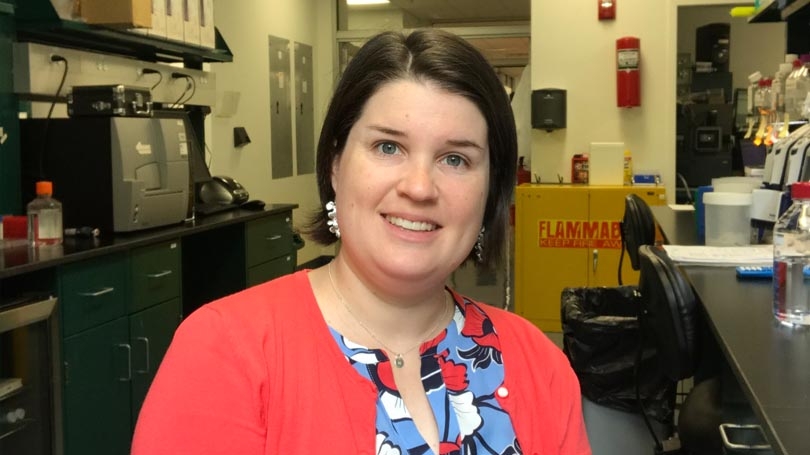
Molly Croteau (PhD Chmeistry, '16) returned to campus last week to meet with current graduate students to talk about her career path. She is currently a scientist at Avitide, a local biotech company in Lebanon, NH.
On October 20, 2017 Molly Croteau, a Dartmouth GRAD alumna (Ph.D. Chemistry, 2016) met with a group of grad students to discuss her path into industry and her current experiences in a biotech company. Now a scientist at Avitide, Molly shared how she prepared herself for a career in industry from graduate school.
Unlike many graduate students who decided to pursue industry later in their graduate career, Molly knew that she wanted to go into industry well before she started graduate school; an industry internship during her undergrad years cemented her conviction. Goal-oriented, Molly knew that she needed to tailor her graduate work to gain skills appropriate for a career in biotech: a good professional network and strong collaborations that would demonstrate her ability to work in a team. Thus, she chose her program and advisor based on whether she would be able to nurture those skills that she knew would be necessary and prepare her well for coming out of graduate school.
During the lunch, Molly highlighted the details of finding her job at Avitide, a smaller local biotech company. Employees at Avitide knew other employees at other local biotech companies, such as Adimab; this became an important aspect later during Molly’s job search as she networked with employees from Adimab during biotech soirees. True to her goals, Molly further sought to expand and solidify her professional network as she collaborated with people as much as possible during grad school, who also ended up in industry.
Preparing for her job search, she had her resume reviewed by Kerry Landers. Molly also prepared for interviews by researching about the companies and finding ways to incorporate her personal stories and experiences to interview questions to highlight her skills as a team worker.
Molly provided invaluable advice for current graduate students hoping to apply to industry positions. While she advised not to be afraid to submit resumes for positions that may not be a perfect match, she stressed tailoring the resume for the job. If an applicant did not possess the skill listed on the position description, Molly suggested taking initiative by either learning it, familiarizing yourself with it (by shadowing people in other labs that do use the listed skill), or at least learning the theory behind it, and show true interest/enthusiasm for the position. For example, she suggested current graduate students to learn some coding skills and to organize the current data in a useable, traceable format to keep up with the increased use of technology in biotech companies.
Furthermore, she stressed the importance of using common sense during and after an interview, such as not texting during the interviews (tours count!), being timely, and sending a thank-you note afterwards (handwritten if possible). Molly also reminded students that interviews are also a chance for the interviewee to learn about the strengths and weaknesses of the company, and if they can work for them.
For the students who were still unsure about whether they would like to pursue a career in academia or industry, Molly had another piece advice: apply and interview, since you will get a better sense of what the environment is like and what the job will entail from the interviews.